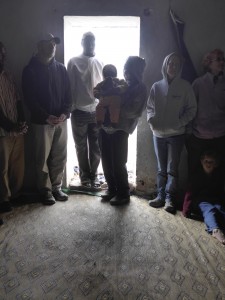We had thought we would only be visiting the two camps, but CEI has decided to take us to a third also, known as Ghala, very close to the border with Algeria. But there is the man with the broken leg who needs medicine: we wait a while on the road by the first camp, waiting for him or for some proxy for him to come to collect some medicine. Then we drive to the edge of the university, where we wait for the team who went to distribute blankets at the university to join us.
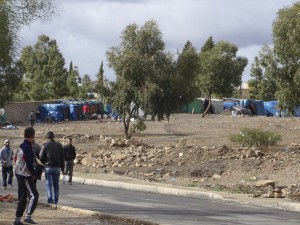
We are parked across from the place where El Hajj was killed. According to Ruben’s latest information, El Hajj was indeed in conflict with the Nigerians over a variety of matters, partly associated with the trafficking of migrants and partly associated with drug trafficking. Not a boy scout, El Hajj. His work here in Oujda was in producing false documentation for people; he may have been in cahoots with people in the Moroccan government to produce these documents. He himself had false papers that said he was a student, which is why the newspapers at first reported that a student had been killed.
El Hajj had indeed been kidnapped, but back in April, and he had gotten free. He had also gone into Algeria, to Maghnia, where the migrants are organized into groups, to argue with the Nigerians there–he had taken Germans to Maghnia—and the Nigerians in Oujda were angry about that. Then he came back to the university, and he peed in the wrong place.
Seriously. He peed in the wrong place. In the migrant community on the outskirts of the university, there are different nationalities, and the people in charge have specified different areas where members of the different groups can pee: El Hajj peed in the wrong place. For this insult, they began to beat him—but the beating was also a result of all the other things he had done to anger the Nigerians. People seem to believe that he died as a result of the beating, but that this was accidental—things got out of hand. Then, since it was the Eid, and everyone had sacrificed their sheep, there was blood everywhere, and so they dismembered his body to try to disguise his death, and they took the pieces out into the forest and left them.
Migrants at the university
Eric and Michelle Derry, two other members of our group, spent some time talking with Elijah, a 23-year-old Gambian. Elijah is one of 6 children; all the rest are girls. It took him five months to get to Oujda, and he arrived the day the Ghanaian was killed. “My dream is dying,” he told the Derry’s. Elijah had made one attempt to cross the border: he described 15-20 people squeezing into a five-seater car: some went in the trunk. “These are just the sacrifices you make to follow your dreams. You save your money and they take you to another camp, just before Mellila. If you have good luck, you get in; if not, you’re beaten. I got sent back: my luck was bad. Still, when I see a girl, I forget all my own troubles, because they are the ones who really have it bad. Thank you for bringing me a blanket, mommy,” Elijah says to Michelle. “Tonight I will sleep, with my blanket.”
Eric also described seeing a man shouting, threatening people. A small group of men closed in on him. “People go a little crazy, sometimes,” another man told Eric. “That’s what this life does to you. We take care of it.” The man who was shouting ended up on the ground, with his shirt ripped, but quiet.
Ghala
We drive to Ghala down tracks that skirt the edges of square fields, barren at this moment except for a luxuriant burst of prickly pear near the occasional building. Ghala is the camp nearest the border; people here occupy a cluster of cement buildings. There are no windows or doors—but someone has draped a blanket over the door to keep the wind out.
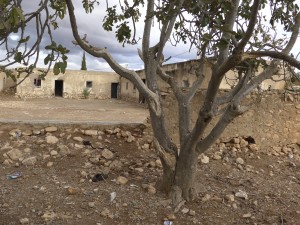
We are met by a small group: three men (Mike, Victor, and Siri) and one women (Blessing). As at the Lambert camp, most people are gone. Siri tells us the women have taken the children to the city for vaccinations. Blessing took her baby Destiny the day before, which is why they are here today.
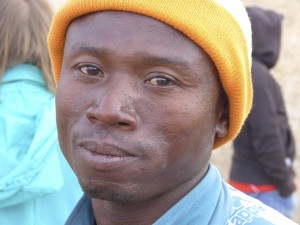
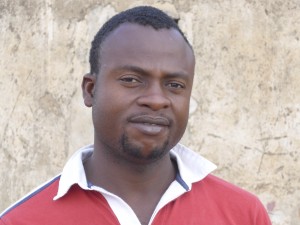
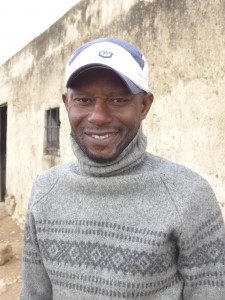
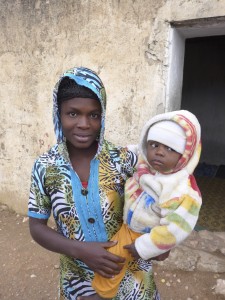
We ask how things have been at the camp, and Siri tells us they have not had much trouble with police over the past four months—which matches the date of the king’s proclamation.
Still, Siri talks about how the community struggles to live: “We work all day, sunup to sundown, picking olives for 70d. But this is not enough to live on.”
Everyone here comes from the Delta state of Nigeria. But many many migrants arrive in Morocco at Ghala though they move on to other communities shortly thereafter.
While we are there, a man from another community (Paul) comes up and addresses Victor as the father of the community. Siri immediately objects: “He’s not the father: I’m the father.”
Paul apologizes: “I’m sorry for the mistake. The other times I was here, he (Victor) was the only one here and I thought he was the father.”
Siri: “It wasn’t a mistake. But I am the father.”
Victor remains silent throughout. There is a sense of deep and troubled waters here.
So too the presence of Blessing is a worrying reminder of a 15-year-old girl with the same name who was rescued from Ghala and brought to a safe house in Rabat after being gang-raped here.
Still, the community gathers for prayers as well as for blankets. What else is there?
